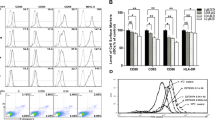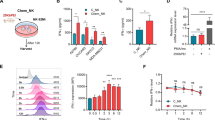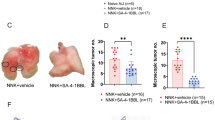Abstract
Purpose
To explore the role of 4-1BBL in nicotine-treated immature dendritic cells (imDCs) mediated anti-tumor effects.
Methods
Bone marrow-derived imDCs were stimulated with nicotine and 4-1BBL expression was determinated by flow cytometry, Western blot and RT-PCR respectively. Then, the roles of 4-1BBL in nicotine-augmented DCs-dependent T cell proliferation, CTL priming and anti-tumor effects were investigated by BrdU cell proliferation assay, enzyme-linked immunospot assay and in vivo preventive effect on tumor development, respectively. Finally, using relative kinase inhibitors, the mechanism of 4-1BBL up-regulation by nicotine stimulation and the roles of Mek-PI3K signal pathways in nicotine-augmented DCs-dependent T cell proliferation were explored by Western blot and BrdU cell proliferation assay, respectively.
Results
Firstly, nicotine could up-regulate 4-1BBL expression in both protein and mRNA levels. Secondly, the effects of nicotine-augmented DCs-dependent T-cell proliferation, CTL priming and anti-tumor effects could be significantly abolished by blocking CD80, CD86 and 4-1BBL activity, respectively. Thirdly, the combined blockages of CD80/CD86, CD80/4-1BBL, CD86/4-1BBL or CD80/CD86/4-1BBL signals could decrease 53.2 %, 29.6 %, 27.9 % and 54.5 % nicotine-enhanced T cell proliferation, respectively. Importantly, nicotine-induced 4-1BBL up-regulation could be decreased by the usage of Mek-PI3K pathway kinase inhibitors. The pre-treatment of Mek-p38-PI3K kinase inhibitors could obviously abolish nicotine-augmented DCs-dependent T cell proliferation.
Conclusions
CD80/CD86 and 4-1BBL are critical for nicotine augmented DCs-mediated anti-tumor effects. 4-1BBL and CD80/CD86 could be considered as potential candidates for preventive and therapeutic tumor vaccination.






Similar content being viewed by others
Abbreviations
- imDCs:
-
immature dendritic cells
- DCs:
-
Dendritic cells
- nAChR:
-
nicotinic acetylcholine receptor
- MAPK:
-
mitogen-activated protein kinase
- PI3K:
-
phosphatidylinositol-3-kinase
- Ni:
-
nicotine
- MLRs:
-
mixed lymphocyte reactions
References
Bassett JD, Yang TC, Bernard D, et al. CD8+ T-cell expansion and maintenance after recombinant adenovirus immunization rely upon cooperation between hematopoietic and nonhematopoietic antigen-presenting cells. Blood. 2011;117(4):1146–55.
Pham NL, Pewe LL, Fleenor CJ, et al. Exploiting cross-priming to generate protective CD8 T-cell immunity rapidly. Proc Natl Acad Sci U S A. 2010;107(27):12198–203.
Gao FG, Wan DF, Gu JR. Ex vivo nicotine stimulation augments the efficacy of therapeutic bone marrow-derived dendritic cell vaccination. Clin Cancer Res. 2007;13:3706–12.
Gao FG, Li HT, Li ZJ, Gu JR. Nicotine stimulated dendritic cells could achieve anti-tumor effects in mouse lung and liver cancer. J Clin Immunol. 2011;31:80–8.
Rangani RJ, Upadhya MA, Nakhate KT, Kokare DM, Subhedar NK. Nicotine evoked improvement in learning and memory is mediated through NPY Y1 receptors in rat model of Alzheimer's disease. Peptides. 2012;33(2):317–28.
Nikfar S, Ehteshami-Ashar S, Rahimi R, Abdollahi M. Systematic review and meta-analysis of the efficacy and tolerability of nicotine preparations in active ulcerative colitis. Clin Ther. 2010;32(14):2304–15.
Orth M, Amann B, Robertson MM, Rothwell JC. Excitability of motor cortex inhibitory circuits in Tourette syndrome before and after single dose nicotine. Brain. 2005;128(Pt 6):1292–300.
Grujic M, Bartholdy C, Remy M, Pinschewer DD, Christensen JP, Thomsen AR. The role of CD80/CD86 in generation and maintenance of functional virus-specific CD8+ T cells in mice infected with lymphocytic choriomeningitis virus. J Immunol. 2010;185(3):1730–43.
Croft M. Co-stimulatory members of the TNFR family: keys to effective T-cell immunity? Nat Rev Immunol. 2003;3:609–20.
Watts TH. TNF/TNFR family members in costimulation of T cell responses. Annu Rev Immunol. 2005;23:23–68.
Lu ZY, Condomines M, Tarte K, et al. B7-1 and 4-1BB ligand expression on a myeloma cell line makes it possible to expand autologous tumor-specific cytotoxic T cells in vitro. Exp Hematol. 2007;35(3):443–53.
Wen T, Bukczynski J, Watts TH. 4-1BB ligand-mediated costimulation of human T cells induces CD4 and CD8 T cell expansion, cytokine production, and the development of cytolytic effector function. J Immunol. 2002;168(10):4897–906.
Wu C, Guo H, Wang Y, Gao Y, Zhu Z, Du Z. Extracellular domain of human 4-1BBL enhanced the function of cytotoxic T-lymphocyte induced by dendritic cell. Cell Immunol. 2011;271(1):118–23.
Cannons JL, Lau P, Ghumman B, et al. 4-1BB ligand induces cell division, sustains survival, and enhances effector function of CD4 and CD8 T cells with similar efficacy. J Immunol. 2001;167:1313–24.
Tan JT, Whitmire JK, Ahmed R, Pearson TC, Larsen CP. 4-1BB ligand, a member of the TNF family, is important for the generation of antiviral CD8 T cell responses. J Immunol. 1999;163:4859–68.
Golovina TN, Mikheeva T, Suhoski MM, et al. CD28 costimulation is essential for human T regulatory expansion and function. J Immunol. 2008;181(4):2855–68.
Krause P, Bruckner M, Uermösi C, Singer E, Groettrup M, Legler DF. Prostaglandin E(2) enhances T-cell proliferation by inducing the costimulatory molecules OX40L, CD70, and 4-1BBL on dendritic cells. Blood. 2009;113(11):2451–60.
Gao FG, Khammanivong V, Liu WJ, Leggatt GR, Frazer IH, Fernando GJ. Antigen-specific CD4+ T-cell help is required to activate a memory CD8+ T cell to a fully functional tumor killer cell. Cancer Res. 2002;62(22):6438–41.
Jin HJ, Li HT, Sui HX, et al. Nicotine stimulated bone marrow-derived dendritic cells could augment HBV specific CTL priming by activating PI3K-Akt pathway. Immunol Lett. 2012;146(1–2):40–9.
Wang C, Wen T, Routy JP, Bernard NF, Sekaly RP, Watts TH. 4-1BBL induces TNF receptor-associated factor 1-dependent Bim modulation in human T cells and is a critical component in the costimulation-dependent rescue of functionally impaired HIV-specific CD8 T cells. J Immunol. 2007;179(12):8252–63.
Sun X, Ritzenthaler JD, Zhong X, Zheng Y, Roman J, Han S. Nicotine stimulates PPARbeta/delta expression in human lung carcinoma cells through activation of PI3K/mTOR and suppression of AP-2alpha. Cancer Res. 2009;69:6445–53.
Chen RJ, Ho YS, Guo HR, Wang YJ. Rapid activation of Stat3 and ERK1/2 by nicotine modulates cell proliferation in human bladder cancer cells. Toxicol Sci. 2008;104:283–93.
Zhang Q, Tang X, Zhang ZF, Velikina R, Shi S, Le AD. Nicotine induces hypoxia-inducible factor-1alpha expression in human lung cancer cells via nicotinic acetylcholine receptor-mediated signaling pathways. Clin Cancer Res. 2007;13:4686–94.
Aicher A, Heeschen C, Mohaupt M, Cooke JP, Zeiher AM, Dimmeler S. Nicotine strongly activates dendritic cell-mediated adaptive immunity: potential role for progression of atherosclerotic lesions. Circulation. 2003;107(4):604–11.
Nouri-Shirazi M, Tinajero R, Guinet E. Nicotine alters the biological activities of developing mouse bone marrow-derived dendritic cells (DCs). Immunol Lett. 2007;109(2):155–64.
Hanna ST. Nicotine effect on cardiovascular system and ion channels. J Cardiovasc Pharmacol. 2006;47:348–58.
Hu SX, Sui HX, Jin HJ, et al. Lipopolysaccharide and dose of nicotine determine the effects ofnicotine on murine bone marrow-derived dendritic cells. Mol Med Rep. 2012;15(4):1005–10.
Sharpe AH, Freeman GJ. The B7-CD28 superfamily. Nat Rev Immunol. 2002;2:116–26.
Acknowledgements
The project was supported by grants from the Natural Science Foundation of Xiamen (No.3502Z20104002), Natural Science Foundation of China and the grant from the National Laboratory for Oncogenes and Related Genes of China (90-08-02). We thank Professor Cao XT (Second Military Medical University, Shanghai, China) for kindly providing EG7 cell lines and Dr. Wang N (Shanghai Cancer Institute) for polishing the manuscript. Also, we thank Jin Hua Su and Fu Chen for excellent animal care. FG. Gao designed the research and wrote the paper. HJ. Jin contributed to Western blot, MLR, ELISA and Elispot. HX. Sui contributed to DCs induction and adoptive transfer. YN. Wang contributed to flow cytometry.
Conflict of interest
The authors declare that they have no conflict of interest.
Author information
Authors and Affiliations
Corresponding author
Additional information
Reprints: Feng Guang Gao Department of Immunology, Basical Medicine Science, Medical College, Xiamen University, Xiamen 361005, Peoples Republic of China. Email: gfengguang@xmu.edu.cn
Rights and permissions
About this article
Cite this article
Jin, H.J., Sui, H.X., Wang, Y.N. et al. Nicotine Up-regulated 4-1BBL Expression by Activating Mek-PI3K Pathway Augments the Efficacy of Bone Marrow-Derived Dendritic Cell Vaccination. J Clin Immunol 33, 246–254 (2013). https://doi.org/10.1007/s10875-012-9761-5
Received:
Accepted:
Published:
Issue Date:
DOI: https://doi.org/10.1007/s10875-012-9761-5




